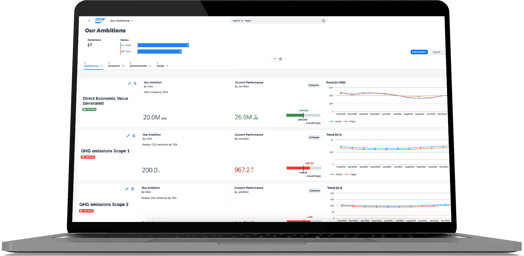With the 54th anniversary of Earth Day on April 22, 2024, now is a good opportunity to review the progress of corporate Environmental, Social, and Governance (ESG) initiatives with an eye toward the future and a review of available tools for monitoring, managing and reporting ESG information.

Previous posts in this series on ESG and carbon accounting, going back to 2021, have closely tracked the development of ESG standards and regulations and the rise of a whole new ecosystem of SAP-based sustainability management solutions.
Just some of the key milestones we've previously discussed include:
- Launch of the International Sustainability Standards Board (ISSB) at the COP26 climate conference in Glasgow intended to give investors, lawmakers and other stakeholders consistent, standardized rules for ESG disclosure.
- SAP's pioneering launch of a new initiative called Climate 21 to reach beyond previous reporting practices with a focus on managing hard data about product-related greenhouse gases and other sustainability issues.
- The September 2021 announcement of SAP's Product Footprint Management (PFM), a new cloud-native application built on SAP Business Technology Platform (BTP) that can be activated in SAP Analytics Cloud (SAC).
- In January 2022, we further explored How Carbon Accounting Can Impact the Value of M&A Deals.
- In March 2022, we detailed new SEC regulations and initiatives, including the Task Force on Climate-Related Disclosures, the Greenhouse Gas Protocol, and the SEC fact-sheet on Enhancement and Standardization of Climate-Related Disclosures.
- In June 2022, Bramasol presented a webinar on How SAP Real Estate Drives Insights For Carbon Accounting.
- In July 2023, we provided an update on the ISSB's first climate focused regulations, IFRS S1 and IFRS S2, which are built on and consolidate the TCFD recommendations, SASB Standards, CDSB Framework, Integrated Reporting Framework and World Economic Forum metrics to streamline sustainability disclosures.
- We also reported on new European Union regulations including the Corporate Sustainability Reporting Directive (CSRD), which became part of the EU’s European Green Deal and the Sustainable Finance Agenda.
In parallel with the codification of ESG, carbon accounting and climate change regulations as detailed above, the evolution of advanced ESG management solutions continued to unfold, most notably with introduction of the SAP Sustainability Control Tower. This comprehensive approach was a major leap forward for end-to-end, ESG transparency and enterprise-wide sustainability management.

What does all this mean for your company?
Firstly, these new mandates are real and the various governmental and accounting organizations have demonstrated a commitment to actively enforcing them. So your company needs to comply.
Secondly, the empirical evidence from multiple studies indicates that corporate adoption of ESG best practices is shown to be having a beneficial impact on mitigating or at least moderating the impacts on global climate change. For example, analysis by the Carbon Disclosure Project (CDP) has shown that companies that disclose and manage their environmental impacts tend to have lower emissions intensity and are better prepared to address climate-related risks.
Finally, from a corporate business perspective, data from the Finance Alliance indicate that tangible benefits of adopting ESG initiatives include:
- Improved risk management
- Enhanced portfolio performance
- Reputational benefits from making a positive impact
- Greater innovation and adaptability
- Attracting and retaining talent
- Strengthened compliance processes
Summary
Driven by our own corporate commitment to addressing climate change, combined with our commitment to helping clients do the same while meeting their ESG compliance and disclosure requirements, Bramasol is pleased to align ourselves with the proactive leadership that SAP has shown in this arena.
In addition to the history of specific ESG and carbon accounting solutions cited above, SAP has now brought all of the pieces together within the SAP Sustainability Control Tower to give companies a holistic, end-to-end capability to access relevant data for recording, analyzing, reporting and acting on their sustainability goals at scale.
This not only benefits companies' bottom lines but has the potential to significantly change the world for the better.

